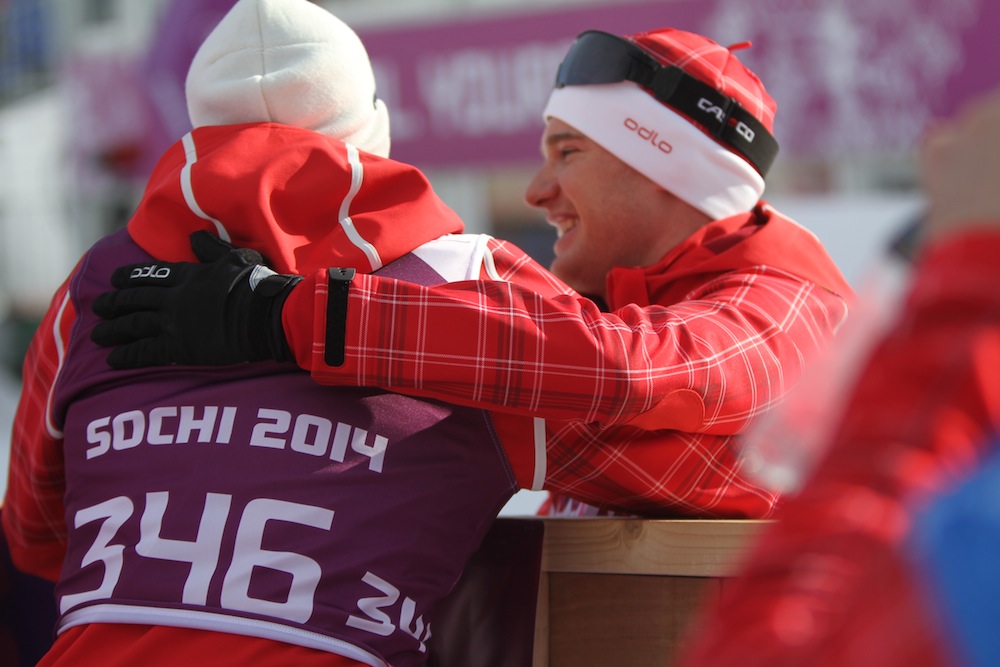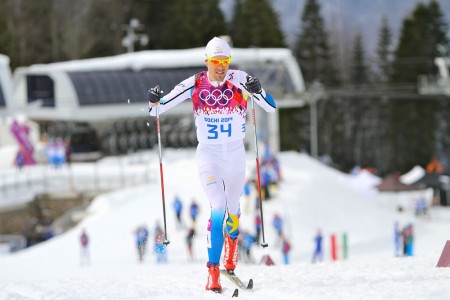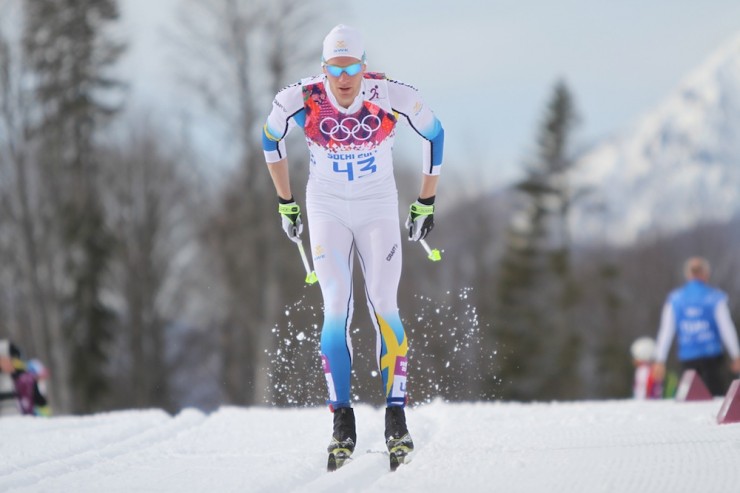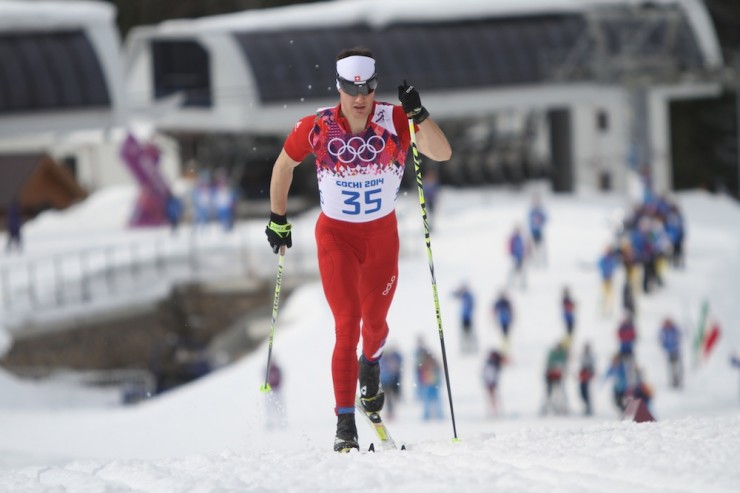
FasterSkier’s coverage is made possible through the generous support of Rudy Project.
SOCHI, Russia — Leading into the Olympics here, Swiss cross-country skier Dario Cologna had raced just twice at an international level this season, an ankle injury putting off his start to the season until mid-January. He’s still walking with a slight limp.
Sweden’s Johan Olsson was doing only a little better. He has been plagued by a rib injury and illness, and has entered just three international events this year, all in December. Until Friday, he hadn’t raced in two months.
And while Olsson’s teammate Daniel Richardsson had been racing all season, he’d been at far from his best form, after tearing a ligament in his knee over the summer in a car accident that killed one of his friends.
Nonetheless, in Friday’s 15-kilometer classic race, all three managed to beat out the 84 other competitors, most of whom had had the whole season to prepare at full strength.
Cologna demolished the field, finishing in 38-and-a-half minutes to win his second gold of the games, and the third of his career. Olsson was 30 seconds behind, and Richardsson another 10 seconds back to round out a patched-up podium.
“It was not easy, but we made the best of the situation,” Cologna said, referring to the performances of the top three. “It’s quite special.”

How did these three convalescent competitors ski away from the rest? The explanation wasn’t immediately clear, but several factors appeared to be involved.
Among them were the conditions. After several consecutive days of temperatures far above freezing, the men were again skiing on a soft, sloppy mess of a course on an uncomfortably warm day—so warm, in fact, that Norway’s Chris Jespersen raced in tights that had been cut off at the thigh.
Patrik Noak, the Swiss team’s doctor, thought that the heat favored Cologna, since the mushy track didn’t provide a firm surface that his competitors could better kick from, with their ankles at full strength.
“These weather conditions, for him, are perfect. Because the snow is really deep, and you have to be really strong in the upper body,” Noak said.
There was also the lack of expectations—Cologna has already won a gold medal at the Olympics here, and hopes were not especially high for the two Swedes in Sochi, given their starts to the season.
“That’s just an advantage for them—they had no pressure beforehand, and they can do what they were planning to do,” Fredrik Aukland, Cologna’s coach, said in an interview.
They didn’t have to worry about being in shape for races earlier in the season, either, Aukland added, which allowed them to aim solely at the games.
“They had to have focus only on the Olympics,” he said.

That was not the case for their competitors like Norway’s Martin Johnsrud Sundby, the World Cup leader and Tour de Ski winner, who was supposed to contend for a medal on Friday.
Instead, he finished more than a minute and a half behind, telling Norwegian broadcaster NRK that he was “fucking disappointed.”
“The body does not work,” he said. “I’m not even close to being close.”
Olsson had the advantage of skiing some of the race with Cologna, who caught him “like a rocket,” Olsson told Aftonbladet, a Swedish newspaper.
“If you stay behind him, you can win a medal,” Olsson said he told himself.
That turned out to be true. Cologna had opened the individual-start race at a slower pace, knowing that the warm temperatures, and
a course that climbed more than 1,500 vertical feet, would require him to save some energy for the last five-kilometer lap.
He was even with Olsson and a Russian skier through five kilometers, and actually trailed the Finnish skier who ultimately placed fourth.
But just over halfway through the race, Cologna had taken the lead, and then with Olsson in tow, he roared to the finish.
So did Richardsson, who was in sitting in fourth place with just half a kilometer to go, but got some information that helped him claw back a couple of seconds over that distance from Iivo Niskanen, the Finnish skier, who was ultimately displaced from the podium by a fraction of a second.
“I heard that Iivo was really tired at the end, and that was the thing that improved my power,” Richardsson said. “I did everything on the last uphill and into the finish, and I managed 0.2 seconds, and I’m really happy.”
The race was also a triumph for Cologna, who had to have surgery in November to repair a torn ligament.

The surgeon, Noak said, was a foot specialist who’s also an avid participant in the sport of orienteering; the procedure was a new method called a tightrope—a band that held together Cologna’s tibia and fibula, Noak said.
During his recovery, Cologna trained by double-poling from a chair affixed to a pair of skis, and kept his legs active on a special treadmill that allowed him to run while only bearing 20 percent of his weight.
Nonetheless, Noak said: “We were a little bit afraid that the time was really a little bit too short.”
Now, Cologna said during the post-race press conference, “I am here with two medals, and it’s unbelievable.”
It’s unclear whether Cologna will race in the men’s relay on Sunday, but he said he’ll definitely compete in the team sprint later in the Games, with his brother Gianluca.
“That will be something that’s very special,” Cologna said.
Then, there’s the last event—the 50-kilometer skate race, which Aukland, Cologna’s coach, said was a big goal.
“That’s been a long time, his dream: to win the 50 k,” Aukland said.
Asked whether Cologna might inflict another injury on himself before the next set of championships, given the results this time around, Aukland paused, then answered.
“Maybe that’s a good idea,” he said.
— Alex Matthews contributed reporting
Nathaniel Herz
Nat Herz is an Alaska-based journalist who moonlights for FasterSkier as an occasional reporter and podcast host. He was FasterSkier's full-time reporter in 2010 and 2011.




2 comments
shreddir
February 14, 2014 at 5:56 pm
If I were the Swiss coaching staff, I would say no relays for you Dario. You need every microgram of stored glycogen possible. He has a chance to pull off a historic gold medal sweep of every individual race in this Olympics. I realize he probably loves his brother, but Gianluca needs to understand what an incredible honor Dario would bring to the Cologna family name by pulling off this sweep.
davord
February 15, 2014 at 12:54 am
The Swiss are having a heck of a 2014 so far! First, Stanislas Wawrinka wins the Australian Open in stunning fashion, then Selina Gasparin wins two IBU WC races+an Olympic silver medal today, Cologna comes back from injury in some fashion, wins two Olympic gold medals (with more coming, potentially), Sandro Viletta wins Super Combined gold today. I am sure Carlo Janka, Simon Amman, and the rest of the top Swiss athletes at these games are waiting to strike for hardware as well. Their hockey team even played well and almost got by Sweden. 5 gold medals, 7 in all. Pretty impressive if you ask me!